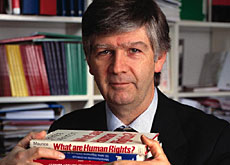UN issues new aid appeal for tsunami victims

Switzerland’s Walter Kälin, a special representative to the United Nations, is calling for more international coordination for the victims of tsunamis in Asia.
But Kälin told swissinfo that the relief effort in Indonesia’s Aceh province risked being undermined by political conflict.
Kälin has been a member of the UN Human Rights Committee since 2003 and earlier this year was appointed as UN Secretary-General Kofi Annan’s new representative on the human rights of internally displaced persons.
swissinfo: There have been numerous calls by the United Nations for assistance for the tsunami victims in southeast Asia. What has the response been like so far?
Walter Kälin: If one looks at the responses of the governments of the countries affected, one sees that some are quite well prepared for disasters like this, others less so. In India, for instance, the authorities immediately drew up an emergency plan to carry out the relief and rescue operations, with the help of paramilitary and armed forces.
In other countries, for instance the Maldives, it seems the government’s capacity to cope is really stretched to the limit, and that they have real difficulties in addressing the situation in a systematic way.
If you look at the donor countries, a lot of help has been announced and will be forthcoming. In the UN system, the emergency relief coordinator in New York, Jan Egeland, is very active. The UN is sending out teams to assess the needs and they will be reporting back very shortly.
swissinfo: The UN says it is launching an “unprecedented effort” to aid the victims. What’s different about this aid effort compared with that for other disasters?
W.K.: I’m not part of the decision-making in the area of natural disasters. But what I think is different is that in many other natural disaster situations one speaks about one country or two or three neighbouring countries, whereas here a whole region is affected.
This means a much bigger effort is needed to address the situation. There are lots of coordination problems; if you look at the different UN agencies doing different types of work, one should avoid having everyone rushing to the same place and leaving gaps in other geographical areas.
I think the big challenge for the UN system is to coordinate its efforts properly.
Another challenge is to ensure that efforts are made to mitigate such disasters in the future. I do not have any basis for pointing fingers at this point, but it is up to governments to ensure the safety of their own people… and the international community has a duty to help them do so.
swissinfo: You mentioned that you were particularly concerned about Aceh province in Indonesia – one of the worst-affected places – because the civil war there is preventing aid from being delivered. Does the same apply to Sri Lanka?
W.K.: In Aceh, the problem in the past has been that the Indonesian government was very restrictive in granting organisations access to the internally displaced people in Aceh – those displaced by the civil war.
It really is to be hoped that the political problems in that area will not prevent access for humanitarian aid.
Sri Lanka is much more open to international assistance despite the political problems there. In fact, on Monday, the president’s office was requesting international assistance.
Before this wave hit, hundreds of thousands of people in Sri Lanka were already displaced as a result of the decades-long war. Many of those same people have been affected once again by this crisis.
swissinfo: There have been reports that the Tamil Tigers and the Sinhalese government have not been cooperating at all in terms of getting aid through and assisting the victims.
W.K.: I don’t have any details. But if true, this would be another example of how political problems may affect the delivery of much-needed aid. This is a moment where, despite political conflict, all sides should cooperate and work together.
swissinfo: Presumably there’s a danger that once the media stops the blanket coverage of the situation in southeast Asia, the public and the politicians in the West will lose interest. Are you concerned about that?
W.K.: It is important not to forget the situation and to follow through. Looking at my own mandate, I know from previous situations that natural disasters do displace large numbers of people. Some can return home quickly, but others cannot because of a lack of infrastructure or because there is no aid to rebuild.
My fear is that those who will not be able to return within a short space of time might not only be displaced for prolonged periods, but also forgotten.
This is one way in which the UN can play a role – to continue to inform about the situation, to continue to draw attention to places where people are in need of assistance and protection, and certainly I will try to do that.
swissinfo-interview: Jonas Hughes
Walter Kälin is the UN Secretary-General’s representative on the human rights of internally displaced persons and an internationally recognised expert on human rights and international law.
From 1991 to 1992, he was the UN’s special rapporteur on human rights in Kuwait.
Since 2003, he has been a member of the UN Human Rights Committee.

In compliance with the JTI standards
More: SWI swissinfo.ch certified by the Journalism Trust Initiative









You can find an overview of ongoing debates with our journalists here . Please join us!
If you want to start a conversation about a topic raised in this article or want to report factual errors, email us at english@swissinfo.ch.